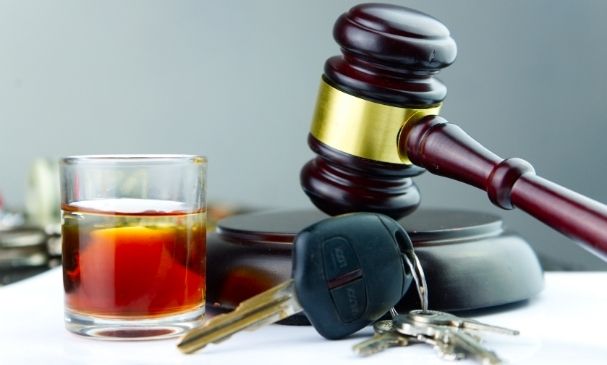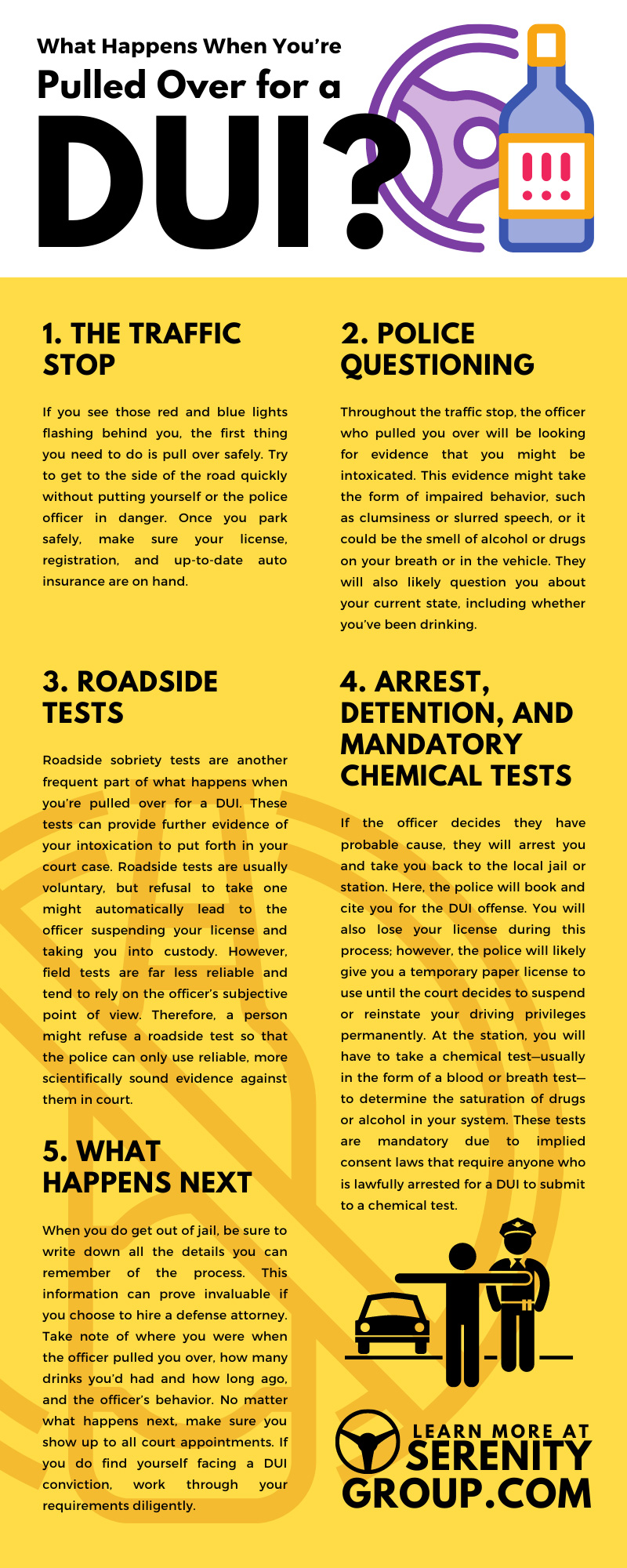What Happens When You’re Pulled Over for a DUI?

If you get behind the wheel after drinking or doing drugs, you pose a threat to yourself and anyone you come across. That’s why cops are always on the lookout for intoxicated drivers. While every DUI case is different, there are a few general procedures you can expect. And when you know what to expect, you can handle the situation as calmly and effectively as possible. Make sure you know the rules and your rights with this rundown of what happens when you’re pulled over for a DUI.
The Traffic Stop
If you see those red and blue lights flashing behind you, the first thing you need to do is pull over safely. Try to get to the side of the road quickly without putting yourself or the police officer in danger. If there’s no safe place to pull over right away, be sure to slow down and turn on your hazard lights to let the officer know that you’re trying to obey and pull over. If you don’t pull over quickly or signal that you plan to pull over, the cop might think you’re trying to evade the police, which can bring extra trouble to your case. Once you park safely, make sure your license, registration, and up-to-date auto insurance are on hand. Being able to hand over this information quickly can make the process much more efficient.
Police Questioning
Throughout the traffic stop, the officer who pulled you over will be looking for evidence that you might be intoxicated. Chances are, they pulled you over in the first place because they noticed signs of impaired driving, such as swerving or drifting in the lane. These indicators create reasonable suspicion that you’ve been drinking and have, therefore, violated the law. Without this reasonable suspicion, the traffic stop is unlawful. If this is the case, you’ll be able to file a motion to suppress later in court and potentially have a judge throw your entire case out.
For now, though, the officer will continue to look for evidence that you were driving under the influence. This evidence might take the form of impaired behavior, such as clumsiness or slurred speech, or it could be the smell of alcohol or drugs on your breath or in the vehicle. They will also likely question you about your current state, including whether you’ve been drinking. Remember that you should never lie to the police in this or any scenario. If you answer that you have been drinking—even just a drink or two a while ago—the officer will continue their investigation to determine if you are currently intoxicated. The cop can even go so far as to search your vehicle if they have sufficient cause to believe there’s incriminating evidence. They can also search your car if you give verbal consent. Anything the officer finds through this investigation—including evidence within the car or incriminating statements you make—can and likely will be used against you in your court case.
Roadside Tests
Roadside sobriety tests are another frequent part of what happens when you’re pulled over for a DUI. These tests can provide further evidence of your intoxication to put forth in your court case. Roadside tests are usually voluntary, but refusal to take one might automatically lead to the officer suspending your license and taking you into custody. Once in police custody, you will have to take a chemical test—which we will discuss further below—to determine your level of intoxication. However, field tests are far less reliable and tend to rely on the officer’s subjective point of view. Therefore, a person might refuse a roadside test so that the police can only use reliable, more scientifically sound evidence against them in court.
Field Sobriety Tests
Officers use field sobriety tests to physically observe your level of impairment, usually by testing your current dexterity or mental capacity. Examples of field sobriety tests include standing on one leg, walking in a straight line, or a horizontal gaze nystagmus test. The problem is that none of these tests are completely scientifically sound and often rely on subjective observation. Furthermore, not everyone can perform these tests while sober. As such, the results rely primarily on the officer’s observations of the situation.
Preliminary Alcohol Screening
A preliminary alcohol screening (PAS) device, commonly known as a breathalyzer or portable breath test, is a handheld device that helps determine your current breath alcohol concentration. PAS devices are less accurate than breath or blood tests that occur at a police station or hospital. As such, the results of a PAS test won’t count against you in court. However, they still provide a quick reading on your breath alcohol content, which an officer can use to determine if they have probable cause for a DUI arrest.
Arrest, Detention, and Mandatory Chemical Tests
If the officer decides they have probable cause, they will arrest you and take you back to the local jail or station. Here, the police will book and cite you for the DUI offense. You will also lose your license during this process; however, the police will likely give you a temporary paper license to use until the court decides to suspend or reinstate your driving privileges permanently. In most cases, you will have to stay in jail until someone bails you out. At the station, you will have to take a chemical test—usually in the form of a blood or breath test—to determine the saturation of drugs or alcohol in your system. These tests are mandatory due to implied consent laws that require anyone who is lawfully arrested for a DUI to submit to a chemical test. If you refuse one of these mandatory chemical tests, you can face further consequences, including fines, license suspension, and the requirement of an ignition interlock device in your vehicle.
What Happens Next
When you do get out of jail, be sure to write down all the details you can remember of the process. This information can prove invaluable if you choose to hire a defense attorney. Take note of where you were when the officer pulled you over, how many drinks you’d had and how long ago, and the officer’s behavior. For example, if the arresting officer did not have probable cause or did not inform you of your rights or implied consent, a lawyer can use that to build a defense for you. No matter what happens next, make sure you show up to all court appointments. If you do find yourself facing a DUI conviction, work through your requirements diligently. Pay fines on time, attend alcohol education courses, and keep up with your SR22 insurance policy. Serenity Group can help with the latter by gathering quotes from insurance companies that offer SR22 policies. We’ll find you the best available policy so that you can put your energy toward the other aspects of your DUI case.


Recent Comments